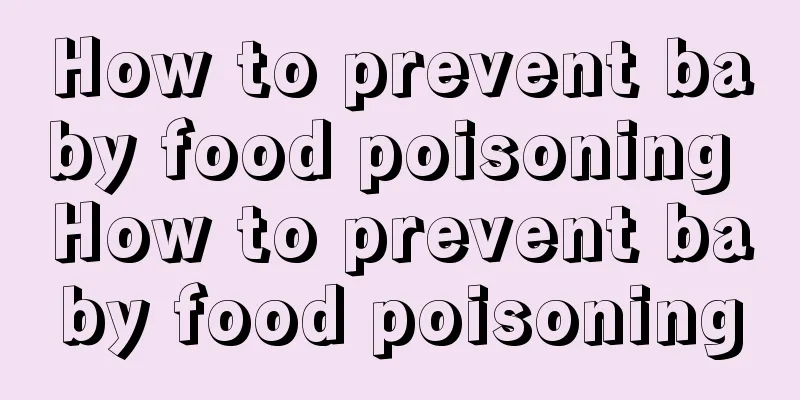What are the symptoms of baby getting angry? See how to care for it with Chinese and Western medicine

|
Maybe one day you suddenly find out why your baby has a lot of eye mucus, and has bowel movements only once every few days, and the color of urine has become yellow and less. At this time, mothers should pay attention to whether the baby is getting angry! In addition to adjusting the rest time and eating habits of babies getting angry, there are many other things to pay attention to and care methods. Let's take a look at what Chinese and Western medicine say. Hot body type with high proportion of heatAccording to TCM, people get sick because of the interaction between the external environment and the human body. The pathogenic factors of the external environment are called the six evils or six evils. The six evils originate from the six qi of the earth, namely "wind, cold, heat, dampness, dryness, and fire". In TCM literature, "fire" can produce warmth, burning, redness, brightness, scorching, inflammation, burning, and dryness, which are also the main causes of fire. Zhu Danxi, a famous doctor in the Yuan Dynasty, believed that people before the age of 16 have pure yang qi, which is hot, and proposed the saying "Yang is often in excess, Yin is often insufficient", which means that children's constitution is hot, and they are prone to Yin deficiency and fire, and virtual fire rises. In particular, infants' immune function is not yet complete and they are easily affected by external evils, so many babies will have symptoms of hot temper. There is a Taiwanese proverb that goes "A girl's buttocks are like three buckets of fire", which reflects the hot nature of children. On the other hand, the nature of fire is that it burns upwards and is erratic, so babies with fire will be very active and prone to night sweats. The rate of fever when they catch a cold is also much higher than that of adults. Some babies with respiratory allergies swallow their snot unconsciously when they sleep in the middle of the night. The snot enters the body and turns into a thick, sticky and yellow state, which is also a sign of fire. The most common areas of heat are the heart and liverFire Qi is divided into virtual fire and real fireThe source of virtual fire is inside the body, also known as deficiency syndrome; real fire is mostly caused by external evil related symptoms, such as bacteria, virus infection. Virtual fire can be further divided into two types of symptoms: "yin deficiency and hyperactivity of fire" and "qi deficiency and hyperactivity of fire". The manifestations of yin deficiency and hyperactivity of fire are dry mouth and throat, red tongue without coating, thin body, restlessness; qi deficiency and hyperactivity of fire will show fatigue and weakness, pale tongue with thin coating, fear of cold and wind, and dryness and heat all over the body. Babies with high temper are mostly mixed with virtual fire and real fire. Zhang Dongdi, director of the Department of Traditional Chinese Medicine Pediatrics of the China Medical University Hospital, said that virtual fire can be supplemented with yin-nourishing medicines such as Rehmannia glutinosa and Ophiopogon japonicus to make it disappear naturally, while real fire can be cleared with heat-clearing herbs such as chrysanthemum and Coptis chinensis. Traditional Chinese medicine says that "the heart and liver are often in excess". The most common "fire" in babies with fire is the heart and liver, the two internal organs, and its symptoms are listed as follows: Heart Fire:"The heart governs the mind" is also called "the heart stores the spirit", which means that the heart is related to the mind and is in charge of emotions and sleep. Babies with heart fire tend to cry and toss and turn in the middle of the night and have trouble sleeping. *Liver fire:The baby is easily angry and noisy. He also has bad breath, constipation, diarrhea, poor concentration and hyperactivity. As mentioned above, there are two types of fire: false fire and real fire. False fire is self-generated, while real fire is mostly caused by external pathogens. Since babies with high fire are mostly mixed with false and real fire, the following five symptoms, in addition to the perspective of traditional Chinese medicine, also ask Western medicine to analyze some symptoms and treatment methods of fire from a pathological perspective, for mothers' reference. *Dry skin, redness and swellingTraditional Chinese Medicine says:Most people will feel dry mouth and tongue when sitting next to the stove, because the fire will evaporate water, taking away the lipids and moisture that moisturize the body, making the skin dry, rough, red and hot. Babies with dry and red skin may have psoriasis, peeling or even urticaria. It is recommended to take Adenophora Ophiopogonis Decoction, Yi Guan Jian, and Liuwei Dihuang Pills to relieve symptoms. Western medicine says:Some babies have very red skin when they are just born. This may be "polycythemia", which reflects that the hemoglobin concentration in the body is too high. Babies with this symptom will have very thick blood, which is easy to cause jaundice. Jiang Mingru, a pediatrician at Dali Ren'ai Hospital, said that the causes of polycythemia include hyperthyroidism (or hypothyroidism) of the baby, late umbilical cord cutting, lack of oxygen in the uterus, and the mother's blood flowing into the baby through the umbilical cord; in addition, mothers with gestational hypertension, gestational diabetes, preeclampsia or cardiopulmonary disease, and living in high-altitude areas are also prone to giving birth to babies with polycythemia. Because twin babies are connected by blood, one baby is prone to anemia after birth, and the other baby will have symptoms of high hemoglobin due to receiving blood transfusion from the other baby. In addition, some babies will have raised papules on their skin 1 or 2 days after birth. This is "neonatal toxic erythema". In addition to the palms and soles of the feet, it will be distributed in various parts of the body, with the face, back, and stomach being the most common. Neonatal toxic erythema is a benign skin rash and one of the common physiological symptoms of babies. It usually does not require treatment and will heal within 1 week. In addition, red patches that peel off may appear on the baby's scalp, face, and chest. The peeling areas are oily and feel like scabs. This is "seborrheic dermatitis", which is common in babies within 1 month of birth. The symptoms will last for about 4 to 6 months. One of the reasons is that the baby's hormones are still high and the body's sebum glands are secreting vigorously. Because the baby's skin is more sensitive, it will appear to be inflamed. Some people will apply sesame oil to their babies to relieve symptoms, but Dr. Jiang Mingru warns that if folk remedies are used, the baby may develop cellulitis. The most important thing in treating seborrheic dermatitis is cleanliness. Before bathing the baby, mothers can apply baby oil to the scabs and rub them to help dissolve the dandruff, and then rinse them off during the bath. If the symptoms are severe, you can go to the hospital for a low-dose steroid ointment mixed with antifungal drugs for treatment. *Increased eye mucusTraditional Chinese Medicine says:Eye mucus caused by internal heat will be dry and yellow, but Chinese medicine practitioners usually do not judge a baby as having internal heat based on this single symptom. They must also have constipation and dry mouth and tongue to determine that the baby has internal heat. If the baby has symptoms of a lot of eye mucus, the mother can boil mulberry and chrysanthemum drink or use chrysanthemum and licorice as tea for the baby to drink. Western medicine says:When babies wake up in the morning, the increase in eye mucus and yellow secretions is mostly caused by blocked nasolacrimal ducts. Because babies' nasolacrimal ducts are narrow and small, tears are easily blocked when flowing down, and yellow secretions will appear when they wake up in the morning, which usually subsides naturally before the age of 1. If mothers want to relieve the symptoms of increased eye mucus in their babies, they can use their fingertips to gently massage the inner corners of their eyes toward the nose, 2 to 3 times a day, 3 to 5 minutes each time, without the need for eye ointment or topical antibiotics. If the baby is over 1 year old and still has a lot of eye mucus, they should be referred to the ophthalmology department, where an ophthalmologist will use a probe to help the baby clear the nasolacrimal duct. Increased eye mucus may also be conjunctivitis. A small number of newborn babies suffer from conjunctivitis due to bacterial infection when passing through the birth canal, and they need to be treated with eye ointment. Older babies may suffer from viral conjunctivitis, with symptoms of red eyes, a lot of eye mucus, and secretions. Infants infected with adenovirus will also have obvious respiratory symptoms, such as fever, sore throat, and cough. Dr. Jiang Mingru pointed out that there is no antiviral drug for viral infections, and children must self-treat through their own immunity. If the baby's eyes are itchy and he keeps rubbing them, the baby needs to use eye drops to relieve the discomfort. *Bad breath, mouth soresTraditional Chinese Medicine says:If the baby cannot speak yet, he/she will be irritable, restless and cry, and refuse to eat or drink. Some babies will even put their hands near their mouths to stir. Babies with bad breath can take Qingwei San and Baohe Wan; babies with mouth and tongue ulcers can take Yunu Jian. Western medicine says:Usually, babies under 3 months old do not have bad odors in their mouths, but mothers will find milk stains and thick tongue coating in their mouths, and white mouth sores on both sides of the inner membrane. Dr. Jiang Mingru said that milk stains in the baby's mouth do not mean that the baby is irritable, but that the baby is not cleaned properly on a daily basis. Some mothers think that the baby needs to be cleaned only after the baby teeth grow, which is a wrong concept. After feeding, the baby's mouth should be wiped with a clean wet gauze. Some babies will have white sores on their tongue or the mucous membrane inside their mouths, with a light red color around them. Not only can they not be scraped off, but they will bleed if scraped hard. This is "thrush", which is caused by Candida infection when the baby passes through the birth canal. Premature babies and babies who have been taking antibiotics and steroids for a long time are particularly prone to thrush because long-term medication affects their immunity. Dr. Jiang Mingru pointed out that this disease usually heals naturally; for babies who cannot heal themselves, mothers can apply antifungal powder on the mouth sores. If a baby over 3 months old has a bad breath, it may be due to poor digestion. It is best not to eat too much or eat too sweet or greasy food before going to bed. On the other hand, bad breath may also be caused by tooth decay or gingivitis. The common symptom of gingivitis is "herpetic gingivitis", which has symptoms such as swollen gums and holes in the mouth. Dr. Jiang Mingru said, "This is really a sign of excessive anger." Herpetic gingivitis can also be cured by itself. Although it can be cured, if it affects the baby's trigeminal nerve, eyes, and genitals, it must be treated with antiviral drugs. In addition, otitis media, sinusitis, and tonsillitis can also cause bad breath and must be treated with antibiotics. Babies usually have bad breath because they do not clean their mouths properly. In addition to cleaning with wet gauze before the baby teeth grow, mothers should also be careful not to let the baby sleep with a bottle in their mouths. Some babies will fall asleep with a bottle in their mouths without knowing it, which can easily lead to the growth of bacteria in their mouths. When feeding, mothers should not chew the food themselves before feeding it to the baby, as this will spread the bacteria in the mouth to the baby. Babies should be given enough water on a regular basis, and should never be replaced by drinks or fruit juice. In addition, mothers are reminded not to ignore the old sayings such as brushing teeth after meals and before going to bed, and eating less sweets. Dr. Jiang Mingru said that many oral problems of babies are actually physiological factors, not caused by excessive anger or heat. The best way is to identify the cause and prescribe the right medicine. *Abdominal distension, abdominal pain, diarrheaTraditional Chinese Medicine says:The abdominal pain and diarrhea caused by excessive internal heat in babies are usually sour and smelly, and come on quickly and suddenly, similar to acute gastroenteritis, and are usually treated with Gegenqinlian Decoction. Western medicine says:"Abdominal distension may be a common neonatal colic." Dr. Jiang Mingru pointed out that about 20% of babies will experience this symptom, which means that 1 in 5 children will suffer from neonatal colic. It is usually most likely to occur in babies who are more than 10 days old to 3 months old, and it will reach its peak in babies who are 6 weeks old. However, the symptoms will usually ease at 4 to 5 months, and only a few babies will continue to suffer from neonatal colic. Babies usually cry once between 4pm and 6pm, and once again at midnight, and the crying time is very long. To distinguish whether the baby has colic, mothers can observe the baby's crying time. If the baby cries for more than 3 hours at a time, more than 3 days a week, and more than 3 consecutive weeks, it can be determined that it is neonatal colic. As for why babies have colic, the cause is still unknown, but there are several viewpoints, including poor lactose tolerance, lack of coordination leading to abnormal intestinal peristalsis, allergic reaction to milk and bloating, and physical constitution. If the mother can feed pure breast milk, the chance of colic in the baby can be minimized. Mothers who cannot breastfeed can give their babies highly hydrolyzed or low-lactose milk powder instead. In addition, milk powder containing galacto-oligosaccharides or palm oil-free formula will reduce the soap calcium in the feces, so that the feces will not be too hard and reduce abdominal distension. It is worth noting that some elders will apply flatulence cream on the baby's belly, thinking that if the baby stops crying, the flatulence will be eliminated. However, in fact, most flatulence creams contain menthol, which will inhibit the nerve conduction in the baby's body. Therefore, the baby does not feel anything when he stops crying, but the flatulence is not really eliminated. Some mothers rush to feed their babies when they see them crying. Dr. Jiang Mingru reminds that overfeeding will expand the baby's stomach and will not help relieve colic. He said that if you want to care for a baby with colic, the mother can hold the baby in front of her chest in a kangaroo hug, or massage the baby's belly clockwise, wipe the baby's body with a warm water towel, or take the baby to an appliance that makes a regular low sound, such as a dryer or washing machine, and soothe the baby through regular audio. In addition, the mother can also let the baby sit on her thighs facing her and pat the baby's back to relieve the symptoms. *Dry stoolTraditional Chinese Medicine says:Babies with internal heat usually have dry and hard stools that are not only difficult to defecate, but also small amounts that are defecate, and appear like small pieces of sheep dung. For babies with constipation and dry stools, doctors will not only teach parents health education knowledge, but also generally give them herbs that nourish yin, clear heat, and clear internal heat, such as Maziren Pills and Zengye Decoction. Western medicine says:Many older people believe that babies with sour and yellow stools have excessive internal heat. However, if the baby is breastfed, because breast milk is easy to absorb and rich in probiotics, it helps intestinal peristalsis, and the stool will naturally be sour and yellow or green. At this time, if the baby is given Chinese medicine instead of milk, it will affect the baby's defecation due to reduced calorie intake, and the chance of jaundice will also increase. On the other hand, because breast milk is easy to absorb, the stool of a pure breastfed baby will become less and less after 3 weeks of birth, and may not defecate for 1 or 2 weeks. However, as long as the baby is growing well, and his activity and diet are normal, mothers do not need to worry too much. Moms may ask, if that's the case, how can we tell whether the baby is constipated? Dr. Jiang Mingru said that when the baby has the urge to defecate but can't, feels pain when defecating, and the stool is dry and hard or even bloody, it can be determined that the baby is constipated. There are several reasons for constipation. The first is insufficient milk intake. For example, the baby needs to drink 1,000cc of milk a day, but the mother only gives him 800cc. The water is completely absorbed by the body, and the stool will naturally become dry and hard. In addition, soaking milk too dilute can also cause constipation, because insufficient nutrition intake and low fiber content make it difficult to form stool. Some mothers dilute milk when they see that their babies are constipated, hoping that the baby can take in more water to help defecate, but the diluter the milk, the harder it is for the baby to defecate, forming a vicious cycle. It is important to drink enough water, but milk is a staple food and should not be confused with water. In addition, if milk or supplementary food is added with excessive calcium or iron, it will also hinder bowel movements. To solve the problem of dry stool and constipation in babies, we can divide it into two parts according to age; babies who have not yet started to eat complementary foods should drink milk at a fixed time and amount every day, and the milk should not be too thick or too thin. If one tablespoon of milk powder is used to make 30cc, if the baby wants to drink 180cc of milk, 6 tablespoons of milk powder should be used. Babies who have started to eat complementary foods can eat more fiber-rich foods, such as applesauce, banana mash, vegetable mash, etc. Some mothers are worried that their children are not nutritious, so they cook bone soup and porridge every day, but they ignore that a balanced diet is the key to development. If the baby's diet does not have the above problems, but still continues to be constipated, the doctor will prescribe a laxative to help defecation. There are also studies showing that taking probiotics can improve constipation. Diet care: avoid hot foodsBabies with internal heat should eat less mango, longan, lychee and other hot fruits and vegetables; high-calorie refined foods such as cheese and chocolate or fried and grilled foods such as tempura, chicken nuggets, and French fries should also be avoided. In addition, spicy hot pot ingredients are easy to make babies dry out their mouths because they contain many spices, so it is best not to eat them. To eliminate the real heat, you can take cold fruits and vegetables such as watermelon, wax apple, pear, orange, tomato, radish, celery, and cabbage; mothers can also cook light vegetable porridge for babies, but be careful not to add spices such as onions and garlic. Lily, a traditional Chinese medicine, can also help babies reduce internal heat. Babies who get angry after drinking milk usually have allergies due to poor digestion of milk protein. Director Zhang Dongdi said that although the question of whether milk protein in milk contains allergens has become a focus of debate in recent years, relevant discussions are indeed recorded in international literature. Some babies do not easily digest the protein in milk. Once it accumulates in the body, it will cause inflammatory symptoms, which is "fire". It is recommended that mothers, if the baby has already started eating supplementary foods, can consume more rice milk and mushy foods, and gradually reduce the proportion of milk. Because allergies can cause "fire" symptoms, when mothers prepare supplementary foods for their babies, it is best to avoid foods that are prone to allergic reactions, such as shrimp, crabs, peanuts or nuts. 6 common nursing problems* Only give your baby herbal tea and fruit to reduce internal heatCold fruits and vegetables can indeed help eliminate heat, but it is not advisable to consume too much. There are many types of herbal teas on the market with different ingredients. The intestines and stomachs of infants and young children are not fully developed yet. If they drink tea that is too cold, it will be harmful to the body instead of beneficial. It is recommended to consult a professional Chinese medicine practitioner before making a choice. * Give your baby your own anti-inflammatory medicineThe types and dosages of medicines taken by adults and infants are different. For example, the heat-clearing Chinese medicine prescribed to adults is Coptis chinensis, while that prescribed to infants is Scutellaria baicalensis. For the dosage, the dosage for adults is calculated in grams, while that for infants is calculated in a few tenths of a gram, which is a relatively low dosage. It is very dangerous for infants to take medicines taken by adults, and they should go to the hospital for a doctor's diagnosis before taking the medicine. *Go to a Chinese medicine pharmacy to get the medicine yourselfFire can be divided into false fire and real fire. If the baby has false fire, then "tonic" rather than "purgative" prescriptions should be used. If parents do not distinguish between false fire and real fire, and blindly use fire-reducing medicines, they will not be using the right medicine and may harm the baby instead. * I only get angry in summer and autumn.Although the body is more likely to develop the "fire" characteristic in the summer due to the hot external environment, it is actually possible to have hot tempers at any time of the year, and personal constitution will also affect when hot tempers occur. *Baby's diarrhea is caused by cold, not heatWhen most mothers see their babies have diarrhea, their first reaction is that they have gastroenteritis or have caught a cold, but they ignore the possibility that it is a symptom of internal heat. If a baby has internal fever in a humid environment, the internal heat cannot be discharged from the body due to the effect of moisture, resulting in strong "internal heat" that disrupts the excretion system and causes diarrhea in the baby. * Yellow skin is a sign of angerWe often hear the elderly say "the baby has heat" which means the baby's skin is yellow, but in fact, a baby with a yellow face may have neonatal jaundice. Jaundice is divided into physiological and pathological types; the jaundice index of physiological jaundice is no more than 15, and the rate of increase is less than 0.5 per hour. In addition to the yellowing of the skin and whites of the eyes, there are no other symptoms, which usually gradually subside after 1 to 2 weeks. The jaundice index of pathological jaundice is usually more than 15, and the rate of increase is greater than 0.5 per hour, or the baby is obviously jaundiced within 24 hours of birth. The symptoms of jaundice in full-term infants last for 1 to 2 weeks, and the symptoms in premature infants last for 2 to 3 weeks. It can be regarded as pathological jaundice. The causes include excessive bilirubin, poor bilirubin excretion, neonatal infection, etc. If the mother finds that the baby is accompanied by abdominal distension, diarrhea, fever, vomiting, poor vitality, and dark tea-colored urine, she must take the baby to the doctor immediately. Babies with jaundice should not drink too much waterSome elders see the yellow color on the baby’s face and think it is due to overheating, so they give the baby plenty of water, but this will make the jaundice worse. Drinking plenty of water can help your baby reduce internal heatTo prevent babies from getting angry, mothers should start with basic diet and lifestyle habits, and avoid feeding babies high-sugar, high-calorie foods. If the baby has symptoms of being angry, the human body has its own detoxification mechanism, which will expel bacteria and viruses through vomiting or diarrhea. The fire and heat in the baby's body will be expelled through urination, so drinking water is also one of the ways to expel the "evil" in traditional Chinese medicine. In addition, Dr. Zhang Dongdi reminded that some mothers boil herbs such as Coptis chinensis and Wubao to remove the heat in their babies, but these two herbs are too bitter and cold and may not be suitable for infants and young children. If mothers find that their babies have signs of heatiness, they should consult a professional doctor to prescribe the right medicine so that their babies can get the best care. |
<<: What are some tips for dealing with children who love to lose their temper?
Recommend
Can pregnant women drink soda water?
Pregnant women can drink a moderate amount of sod...
The efficacy and benefits of Nice toothpaste. Can Nice toothpaste relieve toothache?
You can't always use the same brand of toothp...
What to do if your memory declines after childbirth? Three key points to improve your memory after childbirth
"Where did I put my keys?", "I thi...
How to lose belly fat fastest after cesarean section? What are some exercises to lose belly fat after cesarean section?
After a caesarean section, the mother's body ...
What foods should pregnant women not eat?
There are many things to pay attention to during ...
Does the child snore because he is sleeping soundly? What is the reason for the child snoring?
Sometimes children snore, and parents just think ...
How to choose baby's underwear? How to wash baby's underwear?
The baby's skin is very delicate, which requi...
Can I apply a facial mask during the confinement period? Can I apply a facial mask during the confinement period?
Many pregnant mothers are exhausted after giving ...
Where are Philips electric toothbrushes produced? What batteries do Philips electric toothbrushes use?
Philips is a very popular brand. Where are Philip...
Can I share bath towels with others? Is it better to buy cotton or microfiber bath towels?
Generally, personal belongings are not shared wit...
What clothes should babies wear in autumn? Things to pay attention to when dressing babies in autumn
The weather is cool in autumn, and the temperatur...
Should I buy a misty or mistless humidifier? What is the best capacity of a humidifier?
There are two types of humidifiers on the market,...
Are noise-isolating earplugs disposable? How often should I change a pair of noise-isolating earplugs?
The effect of the noise-isolating earplugs is not...
Avoid these dietary misunderstandings and supplement pregnant women with multivitamins to help you have a better confinement
Confinement is an established custom of the Chine...
Should children be taken care of by the elderly? Three types of elderly people are suitable for taking care of children
This question is a matter of opinion, but I think...









